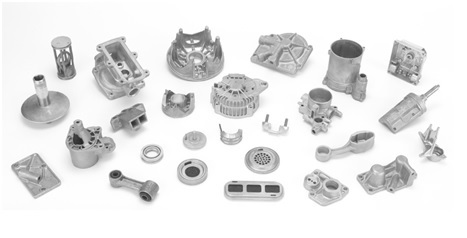Aluminum alloy die casting is a manufacturing process used to create complex and precise metal components. This process involves injecting molten aluminum alloy into a pre-designed metal mold, also known as a die, under high pressure. Once the molten metal cools and solidifies within the mold, the die is opened, and the finished part is ejected.
The aluminum alloy die casting process is highly efficient and cost-effective, making it a popular choice for a wide range of industrial applications. In this guide, we\’ll explore the various factors that impact the die casting process, the advantages of using aluminum alloy as the casting material, and the different types of aluminum alloy die casting techniques.
Factors that Impact the Aluminum Alloy Die Casting Process
Several factors can impact the aluminum alloy die casting process, including the following:
1. Design of the Metal Mold: The design of the metal mold plays a crucial role in the die casting process. The mold must be designed to accommodate the desired shape and dimensions of the finished part, as well as any features such as cooling channels, ejector pins, and gating systems.
2. Choice of Aluminum Alloy: The choice of aluminum alloy used in the die casting process will impact the final properties of the finished part, including its strength, hardness, and corrosion resistance.
3. Operating Pressure and Temperature: The operating pressure and temperature used during the die casting process will impact the flow and solidification of the molten metal within the mold, and ultimately affect the quality of the finished part.
Advantages of Using Aluminum Alloy in Die Casting

Aluminum alloy is a popular choice for die casting due to its numerous advantages, including the following:
1. Lightweight: Aluminum alloy is lightweight, making it an ideal choice for applications where weight is a limiting factor. This material is commonly used in the automotive industry for the production of engine components, transmission cases, and suspension parts.
2. High Strength-to-Weight Ratio: Aluminum alloy has a high strength-to-weight ratio, making it an excellent choice for parts that must withstand high stress or heavy loads.
3. Corrosion Resistance: Aluminum alloy has excellent corrosion resistance, making it suitable for use in harsh environments where exposure to moisture or chemicals is a concern.
Types of Aluminum Alloy Die Casting Techniques
There are two main types of aluminum alloy die casting techniques: hot chamber and cold chamber die casting.
1. Hot Chamber Die Casting: In the hot chamber die casting process, the metal mold is immersed in a pool of molten metal. A hydraulic piston then injects the molten metal into the mold under high pressure. This process is typically used for casting small, intricate parts with low melting points.
2. Cold Chamber Die Casting: In the cold chamber die casting process, the molten metal is poured into a separate chamber and then injected into the mold using a hydraulic piston. This process is typically used for casting larger, more complex parts with higher melting points.
Conclusion
Aluminum alloy die casting is a highly efficient and cost-effective process used to create complex and precise metal components. This process offers numerous advantages, including lightweight, high strength-to-weight ratio, and excellent corrosion resistance. By understanding the factors that impact the die casting process, the advantages of using aluminum alloy, and the different types of die casting techniques available, manufacturers can choose the best approach for their specific needs.
-

- High precision magnesium thixomolding components UAV cover
-

- OEM die casting service metal components of macbook middle
-

- OEM die-casted parts& components
-

- Magnesium alloy die-casting wheel for ebike
-

- Electric Bicycle Magnesium Alloy 12 inch Integrated Wheel 36v10ah Electric Moped
-

- Magnesium alloy rigid fork for bicycle -customized die casting metal parts

 0086-750-5616188
0086-750-5616188 +86 13392089688
+86 13392089688 sales@zhongmei-tech.com
sales@zhongmei-tech.com







